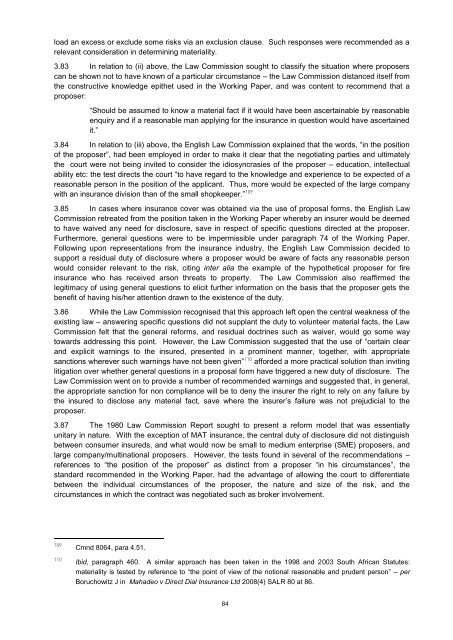Insurance Contracts CP - Law Reform Commission
Insurance Contracts CP - Law Reform Commission
Insurance Contracts CP - Law Reform Commission
You also want an ePaper? Increase the reach of your titles
YUMPU automatically turns print PDFs into web optimized ePapers that Google loves.
load an excess or exclude some risks via an exclusion clause. Such responses were recommended as a<br />
relevant consideration in determining materiality.<br />
3.83 In relation to (ii) above, the <strong>Law</strong> <strong>Commission</strong> sought to classify the situation where proposers<br />
can be shown not to have known of a particular circumstance – the <strong>Law</strong> <strong>Commission</strong> distanced itself from<br />
the constructive knowledge epithet used in the Working Paper, and was content to recommend that a<br />
proposer:<br />
―Should be assumed to know a material fact if it would have been ascertainable by reasonable<br />
enquiry and if a reasonable man applying for the insurance in question would have ascertained<br />
it.‖<br />
3.84 In relation to (iii) above, the English <strong>Law</strong> <strong>Commission</strong> explained that the words, ―in the position<br />
of the proposer‖, had been employed in order to make it clear that the negotiating parties and ultimately<br />
the court were not being invited to consider the idiosyncrasies of the proposer – education, intellectual<br />
ability etc: the test directs the court ―to have regard to the knowledge and experience to be expected of a<br />
reasonable person in the position of the applicant. Thus, more would be expected of the large company<br />
with an insurance division than of the small shopkeeper.‖ 109<br />
3.85 In cases where insurance cover was obtained via the use of proposal forms, the English <strong>Law</strong><br />
<strong>Commission</strong> retreated from the position taken in the Working Paper whereby an insurer would be deemed<br />
to have waived any need for disclosure, save in respect of specific questions directed at the proposer.<br />
Furthermore, general questions were to be impermissible under paragraph 74 of the Working Paper.<br />
Following upon representations from the insurance industry, the English <strong>Law</strong> <strong>Commission</strong> decided to<br />
support a residual duty of disclosure where a proposer would be aware of facts any reasonable person<br />
would consider relevant to the risk, citing inter alia the example of the hypothetical proposer for fire<br />
insurance who has received arson threats to property. The <strong>Law</strong> <strong>Commission</strong> also reaffirmed the<br />
legitimacy of using general questions to elicit further information on the basis that the proposer gets the<br />
benefit of having his/her attention drawn to the existence of the duty.<br />
3.86 While the <strong>Law</strong> <strong>Commission</strong> recognised that this approach left open the central weakness of the<br />
existing law – answering specific questions did not supplant the duty to volunteer material facts, the <strong>Law</strong><br />
<strong>Commission</strong> felt that the general reforms, and residual doctrines such as waiver, would go some way<br />
towards addressing this point. However, the <strong>Law</strong> <strong>Commission</strong> suggested that the use of ―certain clear<br />
and explicit warnings to the insured, presented in a prominent manner, together, with appropriate<br />
sanctions wherever such warnings have not been given‖ 110 afforded a more practical solution than inviting<br />
litigation over whether general questions in a proposal form have triggered a new duty of disclosure. The<br />
<strong>Law</strong> <strong>Commission</strong> went on to provide a number of recommended warnings and suggested that, in general,<br />
the appropriate sanction for non compliance will be to deny the insurer the right to rely on any failure by<br />
the insured to disclose any material fact, save where the insurer‘s failure was not prejudicial to the<br />
proposer.<br />
3.87 The 1980 <strong>Law</strong> <strong>Commission</strong> Report sought to present a reform model that was essentially<br />
unitary in nature. With the exception of MAT insurance, the central duty of disclosure did not distinguish<br />
between consumer insureds, and what would now be small to medium enterprise (SME) proposers, and<br />
large company/multinational proposers. However, the tests found in several of the recommendations –<br />
references to ―the position of the proposer‖ as distinct from a proposer ―in his circumstances‖, the<br />
standard recommended in the Working Paper, had the advantage of allowing the court to differentiate<br />
between the individual circumstances of the proposer, the nature and size of the risk, and the<br />
circumstances in which the contract was negotiated such as broker involvement.<br />
109<br />
110<br />
Cmnd 8064, para 4.51.<br />
Ibid, paragraph 460. A similar approach has been taken in the 1998 and 2003 South African Statutes:<br />
materiality is tested by reference to ―the point of view of the notional reasonable and prudent person‖ – per<br />
Boruchowitz J in Mahadeo v Direct Dial <strong>Insurance</strong> Ltd 2008(4) SALR 80 at 86.<br />
84

















